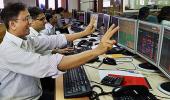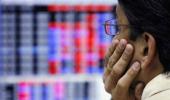How long will the RBI allow the government to borrow cheaply?
A change in policy direction will see rates climb and bond values fall.
Investors in debt funds are therefore at risk, as are people invested in the heated stock market, warns T N Ninan.

You might have expected that a period when people's incomes take a hit, and when companies lose business, would see also a fall in household savings and corporate profits.
Well, you would have expected wrong.
It turns out that household financial savings, usually about 10 per cent of GDP, were more than twice that level in the first quarter of this financial year (April-June).
This, at a time when people were losing jobs and suffering pay cuts.
It was no different with companies -- with a time lag.
In the July-September quarter, sales of more than 2,100 listed companies showed sales in the period having taken a toss, but post-tax profit having grown by over 150 per cent (reversing a decline in the previous quarter).
Profits are now at a respectable 9 per cent of sales.
Finally, we have the infobite that the government, after upping its expenditure in the April-June quarter by 13 per cent compared to a year earlier, amazingly enough reduced its total expenditure at a like rate in the following quarter.
Everyone, it seems, has been conserving cash, while the government has been trying to limit its borrowing.
The explanation is of course uncertainty about the future.
If you don't know what the future might bring, you go into hibernation as a consumer.
In turn, companies that have lost business and are worried about losses decide to cut their expenditure by more than the fall in sales.
Profits have therefore zoomed.
And the government, busy announcing one stimulus programme after another and presumably worrying about finding the money to fund those programmes, cut expenditure where it could.
These trends show up in bank deposits growing faster than loans, in imports falling faster than exports, in the Reserve Bank of India piling up record foreign exchange reserves, and a money market awash in liquidity -- forcing down interest rates as the demand for cash has been less than its supply.
The inflation rate too should fall, since the demand for goods is less than their availability; indeed, many discounts are on offer.
But with excess cash sloshing around, it should not surprise that the inflation rate has surged to the highest level in six years.
The authorities explain that localised, Covid-related lockdowns have caused supply bottlenecks, and that much of the inflation has been in food items with fluctuating supply, like onions and potatoes.
Neither explanation is convincing when lockdowns are reducing, and when even non-food inflation is well above the RBI's target rate of 4 per cent (with 2 percentage points variation allowed either way).
Whatever the cause, the fact is that even the better bonds and debt mutual funds now offer returns lower than the inflation rate, which climbed to 7.6 per cent in October.
Inevitably, riskier funds will come into play even as people turn to the stock market in the hope of better pickings -- and the market has been on a tear.
Flush global liquidity has turbo-charged these trends through capital inflows, and complicated management of the situation.
But uncertainty is now reducing.
The coming months should see a fresh start to spending, and businesses record an upswing.
Imports will grow and, along with that, the trade deficit.
Companies and individuals will borrow more, and the demand for money will grow.
The current dynamic that dictates low interest rates and a booming stock market should therefore change.
But runaway asset-price inflation will stop only when there are reasonable interest rates.
Without that, this could evolve into a Greenspan moment of 'irrational exuberance' as people take riskier bets.
The question is how long the RBI will ignore its mandate on inflation control and keep interest rates below the inflation rate, allowing the government to borrow cheaply.
A change in policy direction will see rates climb and bond values fall.
Investors in debt funds are therefore at risk, as are people invested in the heated stock market.
The correction could be delayed if foreign money keeps pouring in.
But bear in mind that old truth: Things that can't go on forever won't go on forever.
There will be a change in the direction of the wind. One must hope it will be slow and calibrated.
Feature Presentation: Aslam Hunani/Rediff.com












 © 2025
© 2025